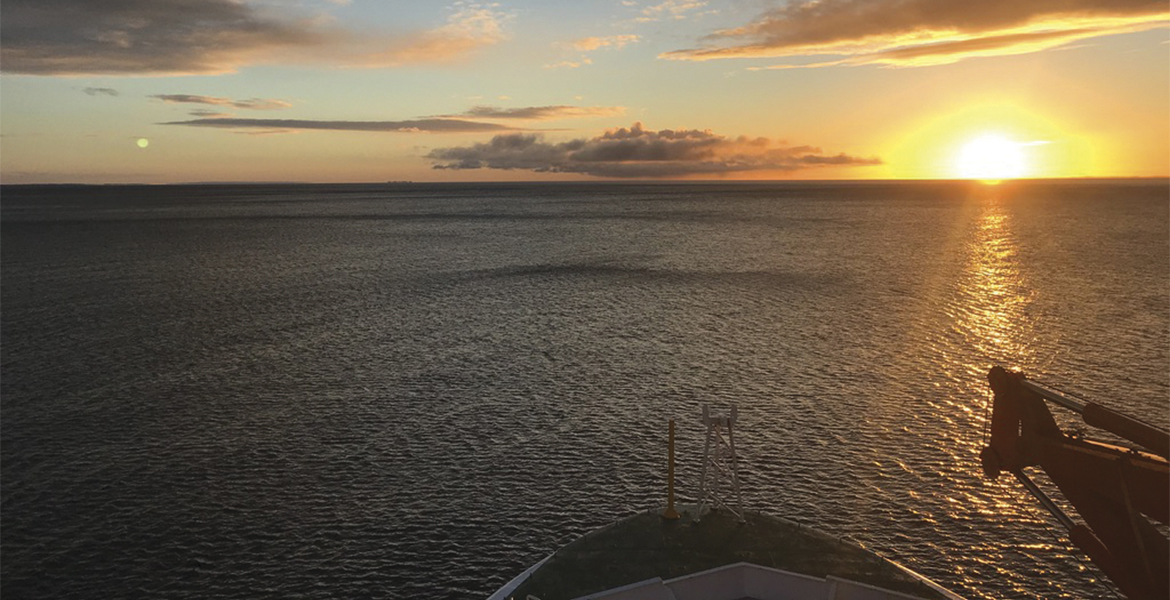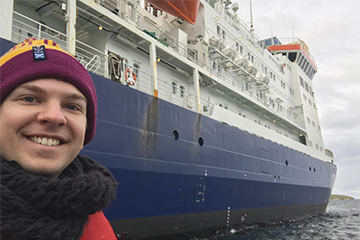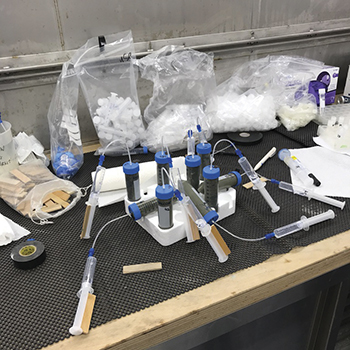
Tracing Earth’s History
Friday, November 1, 2019
Undergraduate’s research explores the very beginnings of the planet

For most students, summer is a time to spend lounging in the warmth of the sun. But Chris Jones spent his summer braving the cold on a German research vessel near Antarctica — where winter was beginning.
Jones, a 2019 Barry M. Goldwater Scholar and former Niblack scholar, is an OSU senior in geology. His research focuses on biogeochemistry, the origins of life and how biological signals are expressed in early Earth systems.
These research interests led him to Natascha Riedinger, an assistant professor in geology. Jones began working in her lab his freshman year and joined her on a research trip to the Argentine Basin during his sophomore year.
This past summer, Jones set out on a second research trip, this time to the South Sandwich Islands for seven weeks.
The South Sandwich Islands are a heavily protected reserve in the southern Atlantic Ocean. Only a few people ever go there, mainly for research purposes. Working with Riedinger, Jones was trying to understand how trace metals are cycled in sediment.
The focus was on such uncommon metals as uranium in the sediment to better understand what the world was like at different times, Jones said.
“We look at ones that are sensitive to changes in O2 content in the water and sediment,” Jones said. “A sudden loss of oxygen would enrich uranium, and that can tell you sort of what was happening in the water column or the sediment.”
These tests allow scientists to better understand what was occurring with the environment many years ago.
“One of my favorite examples is the meteor that hit the Earth and killed the dinosaurs,” Jones said. “It sent all this dust into the air and enriched this whole layer that you can see all over the world with iridium.” This is called the iridium anomaly, a geochemical anomaly in the rocks, that you can now see, Jones said.
The islands provided a unique opportunity for the team.
As Jones explained it, the South Sandwich Islands are a volcanic island chain between South America and Antarctica. On the east side of the island is a deep trench and on the west are hydrothermal vents. Then on top of that, moving from west to east is the Antarctic Circumpolar Current.
Everything that comes out of those hydrothermal vents gets pushed to the east, sandwiched between the vents and the islands, Jones said. This provided a unique chance to study what impact the material in the vents has on other tests being done.

“A lot of people study trace metals or rare elements over open areas or continental margins, and they apply that to global ocean systems,” Jones said. “We asked what if we have this hydrothermal system and polar area that hasn’t really been studied before — what does it look like? And if it looks similar, we have to be able to differentiate.”
Jones utilized a number of different areas of science in his research, including geochemistry, microbiology and sedimentology, Riedinger said. Jones’ curiosity and new eyes helped push the research to a new level, she added.
“One thing people might underestimate is when someone like me, who has done this for a little bit … I have a rough idea [that the results are] probably going to look like X, Y and Z,” Riedinger said. “But then you have this guy who is completely new to the field, and he will bring in these questions from so many different angles.”
Riedinger said this was one of the most interesting parts of serving as a mentor for undergrad research.
Aside from his research, Jones also serves as the assistant director for the OSU writing center. “I realized that writing is important because even if you find this super cool solution, if you can’t tell someone about it, it doesn’t matter,” he said. Jones hopes to one day use his research and writing skill to study other planets.
“My dream job is to be an astrobiogeochemist,” he said. “Working on samples that will get brought back from Europa or Mars, missions that we send to other parts of the solar system.”
Geochemistry can also be used to look into our past, Jones said.
“A lot of things are focused on the today and the now, but I really want to know the origins of how we got to this point in history.”
